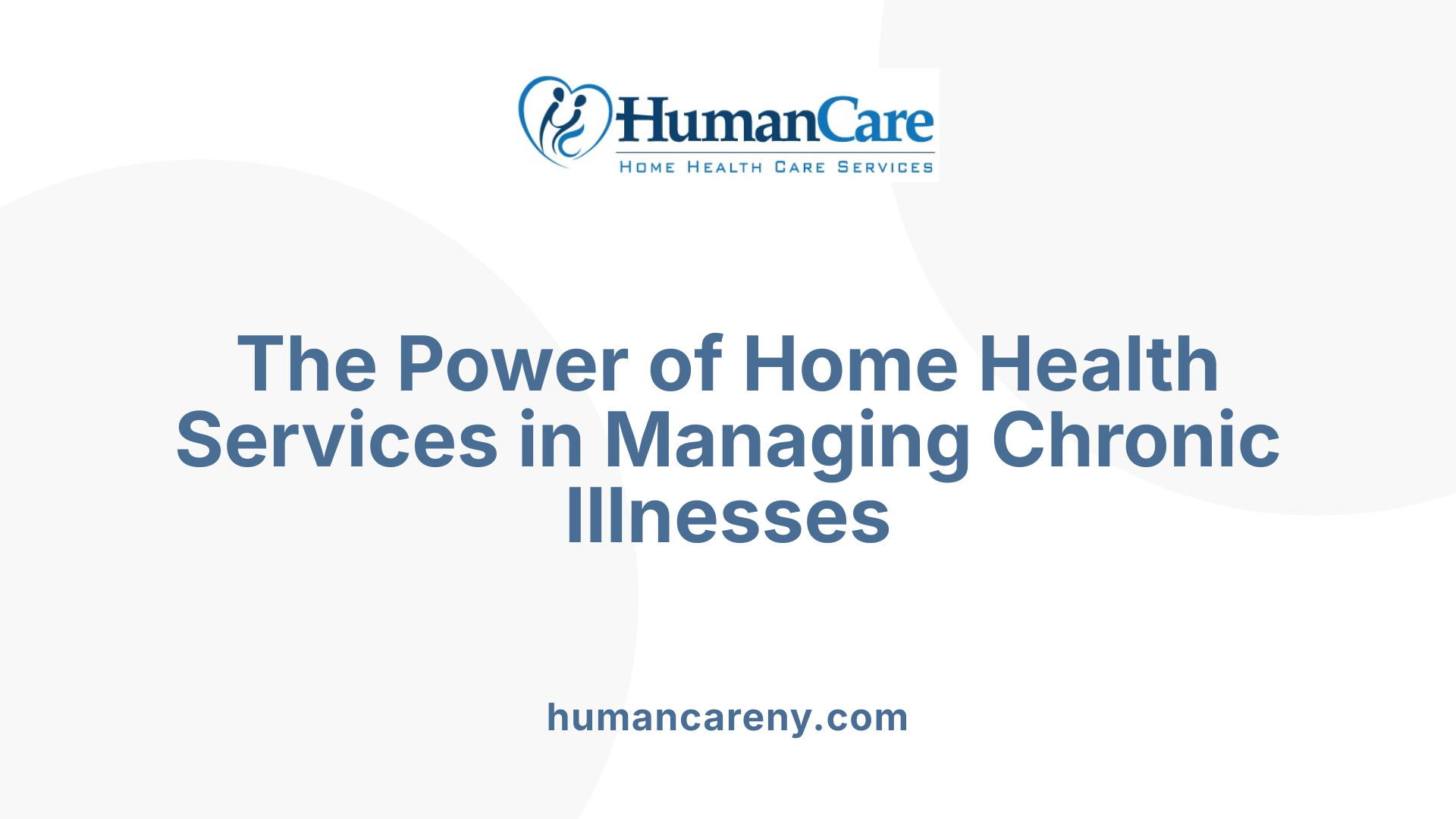Introduction: The Critical Role of Homemaking in Chronic Disease Care
Chronic diseases such as heart failure, diabetes, COPD, and multimorbidity require ongoing management strategies that extend beyond traditional clinical settings. Homemaking care and in-home health services have emerged as vital components of a comprehensive approach, offering personalized, integrated support that improves health outcomes, enhances quality of life, and reduces healthcare costs. This article explores the multifaceted role of homemaking and in-home care, examining how these services contribute to effective disease management, support patients' independence, and foster emotional and physical well-being.
The Impact of In-Home Healthcare on Patient Outcomes

What is the role of homemaking and in-home care in managing chronic diseases?
Homemaking and in-home care are essential components in supporting patients with chronic illnesses such as heart failure, diabetes, COPD, and multimorbidity. These services focus on providing personalized support to help patients adhere to their treatment plans and maintain daily functions.
In-home health assessments conducted by nurses, occupational therapists, and other professionals play a crucial role in identifying social, environmental, and health-related factors that influence disease management. By evaluating the home environment and the patient's daily routines, caregivers can develop tailored interventions aimed at improving health outcomes.
These targeted efforts often lead to reductions in unplanned hospitalizations and emergency department visits. Enhanced activities of daily living (ADL), including mobility, dressing, and self-care, are commonly observed in patients receiving home care services. Furthermore, physiological measures like blood glucose levels in diabetics tend to improve, along with subjective health-related quality of life indicators.
Advances such as smart home technologies and remote monitoring devices bolster in-home disease management. These tools enable continuous tracking of vital signs—like blood pressure and oxygen saturation—allowing for early detection of complications and timely medical responses.
Overall, in-home care fosters stronger relationships between patients and healthcare providers. It encourages active patient engagement, promotes independence, and helps manage chronic diseases more effectively, which can translate into lower healthcare costs and improved well-being.
Benefits of nurse-led in-home care
Nurses providing in-home care deliver a broad range of services, from medication management and wound care to health education and monitoring. Their presence in the patient's home helps ensure treatment adherence, early identification of health decline, and tailored health advice.
Reductions in hospital readmissions and emergency visits
Patients receiving in-home support tend to experience fewer unplanned hospitalizations—on average, one less emergency visit and one fewer hospitalization compared to usual care. These decreases significantly lessen the burden on healthcare systems and improve patient satisfaction.
Improvements in activities of daily living (ADL)
In-home services often lead to meaningful gains in patients' ability to perform daily activities independently. Such improvements are especially noticeable in those with multiple chronic conditions, contributing to better overall functioning.
Physiological and health-related quality of life measures
Medical parameters, including blood sugar levels and blood pressure, along with subjective health status reports, generally show enhancements following consistent home care interventions. These benefits support a more comfortable and active lifestyle for individuals managing long-term health issues.
| Aspect | Impact | Additional Notes |
|---|---|---|
| Hospitalizations | Reduced by 12% | Based on evidence from Ontario's review |
| Emergency visits | Fewer visits, averaging 1 less | Supports better health management |
| Activities of Daily Living | Improvements observed | Better functional status |
| Physiological Measures | Lowered hemoglobin A1c, stabilized vital signs | Enhances disease control |
| Quality of Life | Improved self-reports | Overall patient satisfaction |
In summary, in-home healthcare provides comprehensive support that enhances disease management, maintains patient independence, and reduces unnecessary healthcare utilization. Its multidisciplinary approach, integrating education, monitoring, and tailored interventions, is vital for managing chronic conditions effectively.
Caregiver Roles and Support Systems in Chronic Disease Management

How do caregivers and homemaking support contribute to managing specific chronic illnesses, especially in the elderly?
Caregivers and homemaking services are vital in the ongoing management of chronic illnesses among older adults. They assist with everyday tasks like medication organization, reminders, and monitoring for side effects, which helps keep conditions like diabetes and hypertension under control.
Support with mobility, hygiene, and nutrition ensures the elderly maintain their health, avoid complications, and stay independent as long as possible. For example, helping with meal prep and ensuring proper hydration can stabilize blood sugar and blood pressure levels.
Caregivers also coordinate medical appointments, communicate with healthcare teams, and advocate for the patient. This proactive involvement reduces emergency hospital visits and enhances disease management.
Cultural norms and a sense of familial obligation often motivate caregivers to persevere in their roles despite physical and emotional hardships. Programs like the National Family Caregiver Support Program (NFCSP) offer training, respite, and financial help, which bolster caregivers’ capacity to provide sustained support.
Creating personalized care plans through collaboration with health professionals ensures organized management of medical information and adherence to treatment regimens.
Although caregiving can be demanding, it greatly improves the quality of life for seniors, supporting their ability to live independently. However, ongoing support for caregivers’ mental and physical health remains essential to maintain effective care over time.
Benefits and Effectiveness of Home Health Services

What are the benefits and effectiveness of home health services in managing chronic diseases?
Home health services offer a personalized approach to managing chronic conditions like heart failure, diabetes, COPD, and arthritis. These services deliver medical care directly in the patient’s home, making treatment more accessible and tailored to individual needs. Evidence shows that patients receiving in-home care experience fewer hospitalizations and emergency department visits. For example, in-home care for heart failure patients reduces the combined risk of death and hospitalization by about 12%.
In addition to reducing healthcare utilization, home health services improve patient outcomes by supporting activities of daily living (ADLs) and emotional well-being. Therapies such as physical, occupational, and speech therapy are provided in a familiar environment, which helps maintain or improve functional independence. Emotional support from caregivers and social interaction also contribute to better mental health and overall quality of life.
The integration of technology, such as remote monitoring devices and sensors, enhances the effectiveness of home healthcare. These tools allow real-time tracking of vital signs like blood pressure, blood glucose, and oxygen levels. Early detection of health changes enables prompt interventions, which can prevent complications and hospitalizations.
Overall, home health care proves to be an effective strategy for managing chronic diseases. It fosters better disease control, reduces health-related costs, and supports patients’ independence and dignity, leading to improved overall health outcomes.
Role of Homemaking and In-Home Support in Specific Chronic Conditions in the Elderly
Homemaking care and in-home support services play a vital role in managing chronic conditions among older adults, including diabetes, heart disease, COPD, arthritis, and dementia. These services focus on personalized assistance that promotes safety, medication adherence, and overall well-being within the familiar environment of the home.
For individuals with diabetes, home care providers help organize medications, monitor blood glucose levels, and support dietary adherence. This close oversight helps prevent complications, such as hypoglycemia or hyperglycemia, and reduces hospital visits. Similarly, patients with heart disease benefit from assistance with medication management, regular blood pressure monitoring, and encouragement of heart-healthy activities, which collectively improve clinical stability.
Those with COPD or respiratory issues receive support with oxygen therapy, breathing exercises, and safe mobility practices to prevent falls and manage symptoms effectively. For seniors with arthritis, home modifications, mobility aids, and fall prevention evaluations are crucial in maintaining independence and reducing injury risk. In cases of dementia, caregivers provide structured routines, safety supervision, and emotional support to promote cognitive engagement and reduce behavioral issues.
Homemaking care impacts health outcomes by ensuring continuous adherence to treatment plans, reducing emergency department visits, and minimizing hospitalizations. It also enhances safety through environmental assessments, helping to identify and eliminate fall hazards and improve accessibility.
Moreover, comprehensive in-home care fosters better coordination with healthcare professionals, supporting advance care planning and respecting patient preferences, including end-of-life care options. This holistic approach not only improves physical health but also addresses emotional and social needs, which are essential for the overall quality of life.
While evidence on the effectiveness of homemaking care varies, the overall data suggests that community-based, home-centered care models are effective and often more cost-efficient than institutional settings. Delivering medical, rehabilitative, and emotional support directly in the home promotes better health outcomes, greater independence, and higher satisfaction among elderly patients with chronic illnesses.
Strategies to Integrate Homemaking Care into Chronic Disease Management Plans
How can in-home assessments and adaptive care plans be used?
Effective integration of homemaking care begins with thorough in-home assessments carried out by healthcare professionals such as nurses, occupational therapists, and physical therapists. These assessments provide detailed insights into the patient's environment, everyday routines, and specific needs. Based on these evaluations, adaptive care plans are developed to address individual challenges—be it mobility limitations, safety concerns, or medication management.
Adjustments may include installing mobility aids, modifying the home layout for accessibility, or creating tailored daily routines that promote independence. Such personalized care ensures that patients receive support where they need it most, reducing risks like falls or medication errors.
Regular reevaluations allow for dynamic updates to care plans, keeping pace with the patient's evolving health status or living circumstances. This continuous, individualized approach helps prevent hospitalizations and supports sustained quality of life.
How can therapeutic education, technology use, and team coordination improve outcomes?
Therapeutic education plays a crucial role by empowering patients and their caregivers with knowledge about managing chronic conditions, medication adherence, and recognizing early signs of complications. Clear communication fosters collaboration, leading to better self-management and adherence to treatment regimens.
Incorporating technology, such as remote patient monitoring (RPM) and telehealth, enhances ongoing oversight. These tools enable real-time tracking of vital signs like blood pressure, blood glucose, and oxygen levels, allowing for prompt intervention when necessary. Telehealth also facilitates regular consultations without the need for in-person visits, saving time and resources.
Team coordination among healthcare providers, including physicians, nurses, therapists, and community resources, ensures a cohesive approach. Shared electronic health records and multidisciplinary care meetings promote consistency and timely adjustments to care strategies. Additionally, caregiver training equips family members with essential skills, ensuring the patient’s needs are met effectively at home.
By combining these strategies—comprehensive assessments, adaptive care, education, technology, and team collaboration—healthcare systems can significantly enhance the quality and efficiency of chronic disease management in home settings.
| Strategy | Implementation Focus | Expected Benefit |
|---|---|---|
| In-home assessments | Personalized environment and needs evaluation | Safer, tailored care plans |
| Adaptive care plans | Modifications based on assessment findings | Improved safety and independence |
| Therapeutic education | Patient and caregiver training | Increased adherence and self-care |
| Use of technology (RPM, telehealth) | Remote monitoring and virtual consultations | Early detection and timely intervention |
| Team coordination | Multidisciplinary collaboration | Consistent, holistic care |
| Caregiver engagement | Training and support | Enhanced at-home care quality |
Achieving integration of homemaking services into chronic disease management calls for a multidisciplinary, patient-centered approach that addresses medical, functional, and social needs, ultimately improving health outcomes and patient well-being.
Empowering Patients and Supporting Holistic Well-Being

How do home healthcare services support and empower patients with chronic diseases?
Home healthcare services play a vital role in empowering individuals living with chronic illnesses by providing tailored, comprehensive care directly within their homes. These services focus on delivering personalized care plans that address each patient’s unique medical needs, lifestyle, and environment. Regular assessments by experienced healthcare professionals, such as nurses, occupational therapists, and physical therapists, help monitor health status, identify potential issues early, and adjust treatments accordingly.
Education is a cornerstone of home care. Caregivers and clinicians educate patients about their conditions, medication management, symptom monitoring, and lifestyle modifications. This knowledge boosts confidence and autonomy, enabling patients to actively participate in their own care.
Furthermore, home healthcare encourages the development of self-management skills. Patients learn how to administer medications correctly, recognize warning signs of health deterioration, and make informed decisions about daily activities. Supportive interactions foster trust, motivate adherence to treatment plans, and reduce anxiety related to managing complex health needs.
Modifications to the home environment, such as safety enhancements and assisted device use, promote independence while minimizing risks. The integration of remote monitoring and telehealth technology ensures continuous support, providing reassurance and prompt intervention when needed.
Overall, by combining education, personalized interventions, environmental adjustments, and technological tools, home healthcare services empower patients to take control of their health, improve their quality of life, and achieve better health outcomes.
The Emotional and Physical Benefits of Homemaking care
What is the significance of emotional and physical support provided by homemaking care for chronic disease patients?
Homemaking care offers more than just assistance with daily activities; it provides vital emotional and physical support that significantly enhances the well-being of individuals living with chronic diseases.
Emotional support from homemaking caregivers helps reduce feelings of loneliness, anxiety, and depression. By establishing trust and building meaningful relationships, caregivers create a sense of security that is crucial for patients coping with long-term health conditions. This emotional connection encourages patients to stay engaged in their care plans, adhere to medications, and participate in necessary health-promoting activities.
Physically, homemaking services assist with essential daily tasks—such as meal preparation, mobility assistance, and medication reminders—that maintain patients’ functional independence. When patients feel supported physically, they often experience improved mood and motivation, which can accelerate recovery and improve overall quality of life.
For caregivers, providing emotional support helps mitigate their own stress and burnout. This balance ensures that caregivers can sustain their supportive roles over time, offering consistent, compassionate care.
Overall, integrating emotional and physical assistance within homemaking care creates a holistic approach. It not only helps manage symptoms but also preserves patients’ dignity and independence, fostering a healthier, more resilient outlook on life despite ongoing health challenges.
Conclusion: Strengthening the Foundation of Chronic Disease Care
Homemaking and in-home care are indispensable elements in the management of chronic diseases. By focusing on personalized medical support, emotional nurturing, patient empowerment, and environmental safety, these services foster improved health outcomes and quality of life. As healthcare systems evolve, integrating these home-based support models with traditional care practices will be crucial to addressing the complex needs of individuals with chronic illnesses, ensuring they live longer, healthier, and more fulfilling lives.
References
- In-Home Care for Optimizing Chronic Disease Management in the ...
- Caregiver role development in chronic disease: A qualitative study ...
- Managing Chronic Conditions at Home: How Home Care Can Help
- Managing Chronic Conditions: Home Healthcare Strategies That Work
- The Role of In-Home Care in Chronic Disease Management for ...
- The Role of Home Care in Chronic Illness Management
- Chronic Disease Management at Home: The Role of Home Health ...
- The Role of Home Care in Chronic Disease Management



